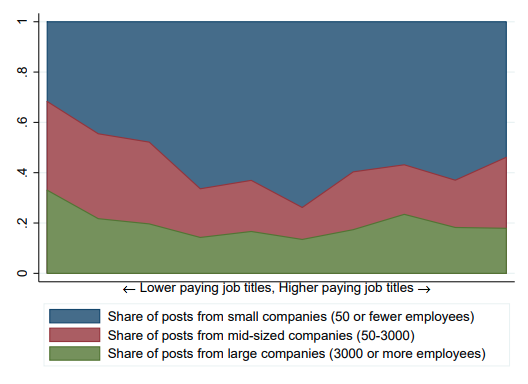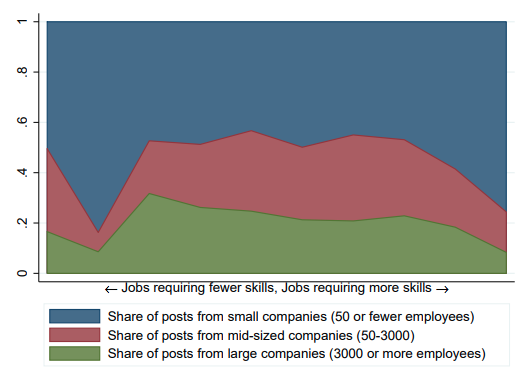We’ve all heard it before: Small business are the backbone of the US economy. But what does it mean? The most recent data shows more than half of US workers are with firms with more than 500 employees, and that number is rising. And we’ve known for a while that big companies often pay better and offer more benefits. So should the United States be worried about back problems?
We think not. And more importantly, we think focusing on levels of employment or on average compensation misses a big part of the story: Small businesses create better jobs. We looked at 4.3 million openings that big, small, and medium-sized companies posted on ZipRecruiter in 2017 and 2018 and looked at which job titles were more likely to be listed by small companies than by big ones.
What did we find? Small companies post some pretty awesome jobs. Higher paying job titles and job titles that require more skills are both disproportionately likely to be posted by smaller companies. When we zoom in on the titles where small companies are most over-represented (relative to big ones), the examples confirm the broad picture: The top jobs that small companies list more than big ones tend to be great jobs.
Which types of jobs
We wanted to start with a broad assessment of the trends. So we took our data on over 10,000 different job titles and broke them into ten groups. We did this in two ways.
First, we took ZipRecruiter posts with salaries, and split up job titles based on the median salary. This lets us split posts into those for higher paying and lower paying types of jobs.
Next, we looked at skills. We counted up the number of skills listed in each post, and took an average across all the different posts for a particular job title. Then we grouped titles based on the average number of skills listed in a post. This lets us split posts into those with more skill demands and those with less (“higher-skilled” and “less-skilled” jobs).
Figures 1 and 2 show how posts from small, medium-sized, and big companies make up each set of job titles. Figure 1 shows that small businesses do much more of their hiring in middle- and high-paying occupations. For the 10% of job titles with the lowest median pay (the far left of the figure), about 30% of openings are posted by small businesses (those with 50 or fewer employees). Large companies (3,000+ employees) make up roughly the same share.
But as you go towards the right and look at higher-paying occupations, small businesses start to make up a bigger and bigger share of total posts. By the time you get to the middle of the figure (looking at medium-paying job titles), small businesses account for 70% of posts (more than double their share of the lowest-paying positions’ posts). And this pattern holds across all of the higher-paying job titles, with small businesses’ share of openings fluctuating between 60% and 70% of openings.
In other words, small businesses make up a modest share of posts for low-paying positions, but a huge share of posts for higher-paying ones.
Figure 1. Small business post fewer openings in low-paying job titles

That’s what happens when we compare job titles with high and low median salary. What about on the skills side? As we explained above, we split job titles into 10 groups based on the number of skills normally listed in an opening. Figure 2 shows small businesses’ share of openings for these different skill groups.
For most of the figure, things look pretty much the same. Except for a weird spike in the second group (The First Law of Data: The world is messier than you want it to be), the pattern is fairly consistent: Small businesses account for 50% of openings, medium-sized account for 30%, and big companies account for 20%.
Things stay pretty flat and stable until you get to the 20% of jobs with the most skill demands (the far right). There, big companies’ share of posts collapses from 20% to less than 10%, medium-sized companies’ falls to about 15%, and, in the 10% of job titles with the most skill needs, small businesses now account for more than 75% of posted openings. The story is clear: Small businesses do more hiring for higher skilled positions.
Figure 2. Small businesses make up a bigger share of skilled job openings

But which jobs is it?
So small companies do more hiring for jobs requiring more skills? But which ones? We thought you might be wondering, so we identified the 10 jobs where small- and medium-sized companies were most “over-represented,” relative to big ones.
Specifically, we broke openings down by job title and industry. For each type of job, we calculated the share of all small companies’ posts in that industry that were for that job title. We did the same for medium-sized companies. Then we compared the prevalence of a job among small companies’ and medium-sized companies’ posts with its prevalence among big companies’.
That’s confusing, so let’s talk about an example. Out of every 20,000 business openings posted by big companies, only 1 is for a Regional Account Executive. But for medium-sized companies, out of every 20,000 openings, there are 127 Regional Account Executive posts. That’s a big difference. So we say that “Regional Account Executive openings are over-represented among medium-sized companies, compared to big companies, by 127:1.”
Table 1 gives the job titles and industries where small companies have the biggest over-representation, compared to big companies. Looking at row 1, for instance, you see that a small company operating in the business field is 1,339 times more likely to be hiring a Media Sales Executive than a big company is. This is, admittedly, and extreme example (row 2 is the job with the second highest small company over-representation, and it’s only 606:1).
But, the shocking 1339:1 Media Sales Executive example aside, the table as a whole hammers home the main message of the figures above: Jobs where small companies do more hiring than big ones tend to be pretty good jobs. Most jobs in the table have median salaries above the average (none are in the bottom third of pay), and the diverse mix includes management non-management positions, jobs that do and do not typically require a college education, and entry-level and executive positions. All in all, the jobs where small companies are disproportionately active tend to be good ones.
Table 1. The top jobs where small companies are over-represented compared to big ones
| Industry | Job title | Small business over-representation factor (compared to big companies) |
|---|---|---|
| Business | Media Sales Executive | 1339:1 |
| Transportation | CDL Truck Driver | 606:1 |
| Business | Public Relations Specialist | 479:1 |
| Retail | Entry-level Assistant Manager | 419:1 |
| Business | Public Relations Assistant | 392:1 |
| Automotive | Automotive Buyer | 204:1 |
| Business | Marketing Communications Assistant | 204:1 |
| Business | Entry-level Marketing Assistant | 177:1 |
| Food | Hospitality | 172:1 |
| Business | Assistant Brand Manager | 150:1 |
To a lesser extent, a similar pattern holds for jobs where medium-sized companies are over-represented (again, compared to big ones). These are given in Table 2. Among jobs where medium-sized companies do disproportionate hiring, there are a number (like Cashier and Call Center Professional) that are relatively low paying and perhaps less desirable. Nonetheless, many highly-paid and very competitive jobs (like Insurance Underwriter and Merchant) are much more likely to be found among medium-sized companies than large ones.
Table 2. The top jobs where medium-sized companies are over-represented compared to big ones
| Industry | Job title | Medium business over-representation factor (compared to big companies) |
|---|---|---|
| Finance and Insurance | Insurance Inspector | 479:1 |
| Business | Sales Outside Sales | 359:1 |
| Business | Call Center Professional | 302:1 |
| Business | Public Relations Specialist | 221:1 |
| Finance and Insurance | Insurance Underwriter | 216:1 |
| Business | Public Relations Assistant | 211:1 |
| Retail | Entry-level Assistant Manager | 192:1 |
| Finance and Insurance | Final Expense Insurance Agent | 189:1 |
| Retail | Cashier | 186:1 |
| Retail | Merchant | 180:1 |
Conclusion
At ZipRecruiter, we want the right workers to find the right jobs, and the right managers to find the right applicants. For different workers and different companies this means different things. But although much ado has been made recently about big companies being better employers, we think that conclusion is a bit premature. A deeper dive into the types of jobs being offered suggests a lot of great opportunities at small companies that just aren’t available at their bigger competitors. Sometimes big things come in small packages.









